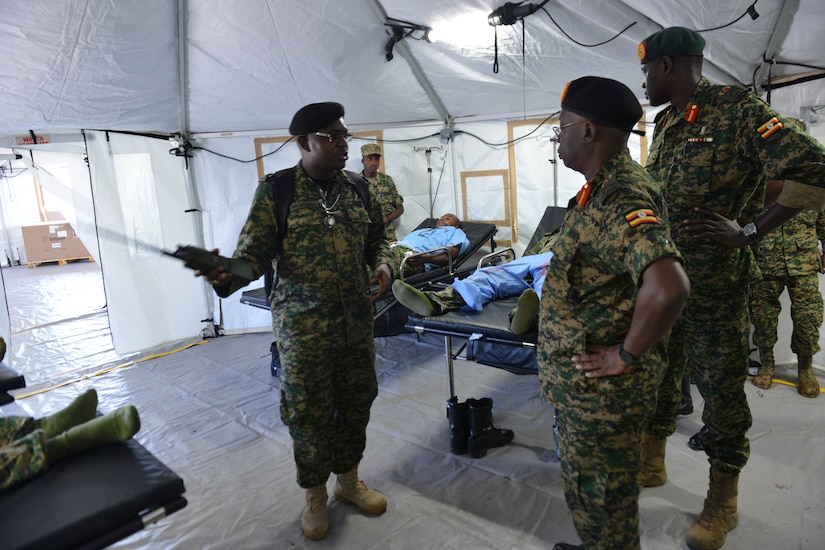April 14, 2020 | BY Army Staff Sgt. Flor Gonzalez , DOD News
As the world fights to contain the COVID-19 pandemic, the
United States, through U.S. Africa Command, is doing its part to help African
partner nations combat this new enemy.
In 2019, four African partner nations — Ghana, Senegal,
Uganda and Rwanda — were provided with the training and equipment to
efficiently and effectively set up, take down and operate a United
Nations-standard level 2 hospital through the African Peacekeeping Rapid
Response Partnership program.
The program, funded by the State Department, helps African
nations enhance peacekeeping and security capabilities. Of these four partner
nations, three are now deploying their level 2 hospitals as part of their
response to the COVID-19 pandemic.
"We are proud to stand by our partners as we battle
this deadly virus in Africa and around the globe," Air Force Lt. Gen.
James Vechery, Africom's deputy commander, said. "As we work shoulder to
shoulder, it is exciting to see our African partners putting the capabilities
we've developed over the past few years to such great use during this global
pandemic."
It is our hope that the support we provide to our partners
enables them to lessen human suffering and strengthen their nations, their
people and the global community."
The hospitals are one example of Africom efforts to assist
African partners to enhance their medical capabilities and pandemic response.
Programs such as tactical combat casualty care training, medical readiness
exercises and conferences focused on pandemic response efforts all demonstrate
the long-term investment by the command.
Ghana, Senegal and Uganda independently decided to deploy
their hospitals in support of their national response, said Air Force Maj.
Mohamed Diallo, Africom international health specialist. Senegal and Uganda are
using the hospitals as overflow facilities for existing hospitals. "We are
going to start treating people," Lt. Col. Henry Obbo, Uganda Land Forces
spokesman, said. "It's just put here... in case the means of health might
require additional facilities."
Ghana, which has nearly 300 confirmed cases of COVID-19, is
using the facility to treat those affected by the virus.
"Now more than ever, the United States is pleased to
work together with the government, armed forces and people of Ghana," U.S.
Ambassador to Ghana Stephanie Sullivan said. "This mobile hospital will
directly serve those most in need. Together, we will emerge from this stronger
and more united."
Sullivan echoed Ghanaian President Akufo Addo's call for all
Ghanaians and residents of Ghana to stay home as much as possible, as it's one
of the most effective ways to combat the pandemic and "flatten the
curve."
Each hospital package includes 14 shelters with a total of
7,427 square feet of shelter space, consisting of an intensive care unit, a
radiology unit and 20 beds.
"While these hospitals were originally designed to
support Senegalese soldiers on the battlefield, the Senegalese military has now
deployed one of these hospitals and personnel to the city of Touba to assist in
the emergency response to the COVID-19 outbreak," said U.S. Ambassador to
Senegal Tulinabo S. Mushingi.
Combined with the support from other U.S. agencies such as
the Centers for Disease Control and Prevention and the U.S. Agency for
International Development, known as USAID, these contributions have greatly
strengthened Senegal's ability to respond to the COVID-19 threat and
demonstrate the strength of the strong 60-year U.S.-Senegalese partnership, the
ambassador added.
The effort highlights a whole-of-government approach aimed
at ensuring African partners are educated, resourced and supported to contain
the spread of the virus, Africom officials said.
"This program, and the medical capabilities it brings
to the COVID-19 fight on the African continent, is a prime example of the unique,
continuing commitment that U.S. Africa Command pledges to our Africa partners
throughout Africa," Air Force Col. Krystal Murphy, Africom's deputy
command surgeon, said. "It is our hope that the support we provide to our
partners enables them to lessen human suffering and strengthen their nations,
their people and the global community."
(Army Staff Sgt. Flor Gonzalez is assigned to U.S. Africa
Command.)

No comments:
Post a Comment